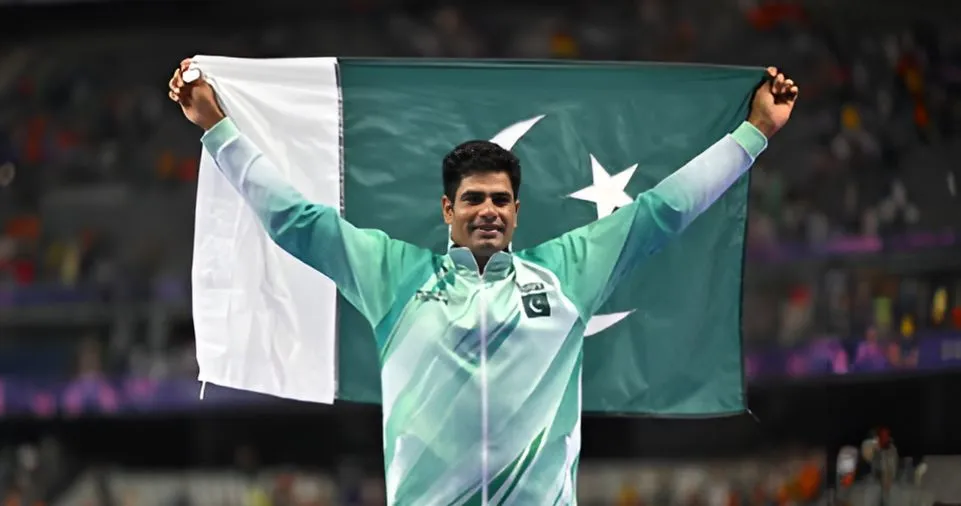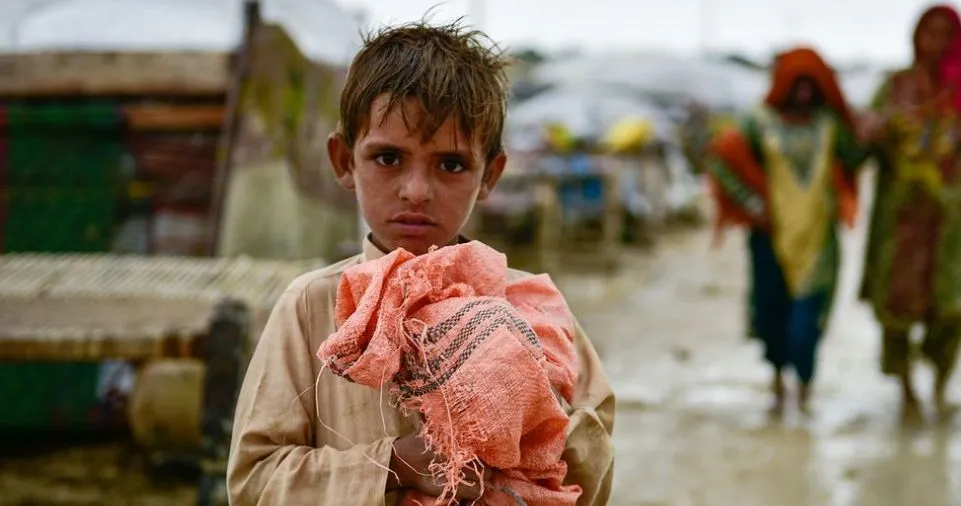THE paradox often comes as a startling realisation that Pakistan’s 77-year journey mostly represents the fate of a drifting country that has been moving in the wrong way from the beginning. Beyond a paradox of contradictions, the collective missteps that have so far led to the wrong side of history include a migration marred by violence, an inexcusable delay in the draughting of a constitution, the use of force to revoke a recently promulgated constitution, and the dissolution of the nation that had worked so hard to become just 24 years old.
But as things now stand, nation-building is not quite completed to the point where the beloved notion of ideology-driven nationhood, tinged with the academic feeling of unity, is fading quickly. The populace is considering migrating in large numbers from the promised land to remote parts of the world in search of a phantom opportunity to start over in unexplored areas due to the nation’s steadily declining human progress metrics.
While some residents pursue enviable means of existence outside of their country, a fast growing desire to dwell permanently in every corner of the globe except their own is firmly ingrained in their overall attitude. It is possible to draw comparisons between this prevalent view of desertion and the seasonal phenomenon of widespread animal migration on Earth. What’s most fascinating is that, when it comes to their attachment to their native land and the necessity to relocate large distances in search of a temporary home, the creatures tend to be more patriotic than humans.
National fear is spreading like wildfire, from a personal crush to a pandemic that affects almost every group of people in the country—more than 242 million people, especially the younger generation. This generation in this region of the globe has nothing more than hope for a good future since they come from a culture that treats its minorities badly, denigrates women, punishes children for being innocent, and repeatedly fails its youngsters.
With the public’s mistrust in the country’s governance institutions growing, the young of this crisis-ridden nation are most concerned about their future well-being.
Restoring the younger generation’s declining faith in their abilities to steer the system in the correct direction requires a response from the individuals in positions of authority and the general populace.
Depleting confidence
In the midst of a severe socioeconomic crisis that defines our country’s identity in the international community, it is the responsibility of society and policymakers in general to reinstate the younger generation’s dwindling faith in their ability to steer the system in the right direction and to give them newfound hope for a future full of equal opportunities, growth opportunities, and opportunities for positive change.
This may seem like a difficult assignment, but in order to save the young from existential crises, the individuals in positions of authority and the general public must step up and come up with a multifaceted plan of action. Above all, though, a great deal of reflection and introspection are needed to identify the problem underlying the general wave of pessimism, public criticism, and general frustration that is quickly replacing the collective reasoning with an outpouring of agitation and agony that is evident everywhere.
In regards to youth in particular—the heyday of one’s life, full of enthusiasm and tremendous energy—it is always cause for great concern to witness the transformation of this period into one of instability and unpredictability, struggling with issues related to its own welfare as well as the general dysfunction of the government apparatus, as well as the inconsistent provision of public services and civic amenities with no obvious indications that things will get better.
Young people’s condition is complex and involves more than just addressing the twin evils of unemployment and illiteracy. Not only have they been deprived of their constitutionally guaranteed access to an education and other rights, but previous administrations have also taken advantage of them for their own personal gain. The young people in the country are frequently relegated to the bottom of the priority ladder when it comes to policy attention, having been repeatedly taken advantage of by the state apparatus under the pretext of holy militarism and political awakening. They are also frequently abandoned by those who are meant to look out for them and safeguard their future, leaving them in the dark.
Numerous chronic deprivations, including absolute poverty, ongoing economic hardship, limited employment opportunities, and generally lower life satisfaction, have been plaguing individuals with minimal education and low socioeconomic profiles for generations on end. Even worse, the widespread destruction of meritocracy in the fields of work and public education gives the younger generation the erroneous impression.
In theory, it should be simple to instill optimism in those affected by the crisis and empower them to take charge in creating a better future. But a big obstacle that will need more than just talk—rather than empty words—is their growing mistrust of public institutions and the government. The place where we used to live, with its progressive credentials and booming economy, is no longer in existence. The people in charge should act quickly to address this issue before the people of our country become a burden to the rest of the world, because, in all honesty, we now live in a nation that is fighting for its life.
ALSO READ:
Despite the unlikely appearance, there are other criteria outside a regime’s strong economic performance that may be used to assess a government’s effectiveness or shortcomings. Frankly, there are a number of ways an efficient government may provide much-needed relief to the public, rebuild their faith in the system, and regain their trust in spite of the economic slowdown and budgetary crisis. In addition to promoting sustainable economic growth and employment opportunities, good governance standards also encompass upholding the rule of law, the government’s ability to develop, carry out, and accomplish its policy objectives, accountability, transparency, responsiveness, community involvement, the respect of government institutions that control the social and economic environments, and unfettered access to information.
In order for the government to perform as intended, the previously described characteristics that outline how the apparatus works must be within its power. Yet, the state-building process has suffered greatly as a result of the present governance crisis and the successive administrations’ demonstrated incapacity to carry out their fundamental duties, leaving the populace in a condition of fear and hopelessness. All feasible measures to enhance the delivery system and boost the state’s ability to meet its responsibilities must be explored by the administration and political players.
Civil society and the intelligentsia have primary responsibility for their failure to rise to the occasion and improve the lot of the nation’s young, even while the governing class bears the brunt of the blame for the failing government framework. The youth demographic is used as fuel to support the state’s quickly shifting narrative whenever the necessity arises.
Apart from fostering sustainable economic development and employment opportunities, upholding the rule of law, the government’s ability to create, carry out, and fulfil its policy objectives, accountability, and openness are all considered basic components of good governance.
The literary community, which includes intellectuals, opinion leaders, poets, writers, media professionals, and filmmakers, bears some of the blame for the current state of despair and widespread desolation. These groups have utterly failed to call attention to the pervasive pessimism that is now deeply ingrained in the national consciousness. The neighbouring country has been making continuous efforts to boost national morale, foster patriotism, and strengthen the nation’s self-awareness. One such endeavour is the production of films and television series, which are specifically designed to inspire young people to be leaders of positive change, encourage them to participate in sports, and allow them to represent their nation in international competitions. Pakistan, too, has seen intermittent efforts of this kind. Even yet, despite the fact that films are among the best mediums for enlightenment, raising public consciousness, and creating public education, their potential to impact much-needed change has never been completely realised.
A further reason for the general dejection and despondency among the populace is the absence of a clear vision. That was the force behind the ascent of over four million Indian Muslims to physically cross the river of blood in search of a brighter future in a nation of their own, as it happened not too long ago. To put it simply, the current national depression is a terrible visual impairment that prevents us from seeing Pakistan, despite the fact that it cannot eclipse the heartbreaking story of the bloody 1947 exodus.

This too will pass.
This, too, will pass. The lack of a common understanding of an uplifting, unifying vision, on the other hand, is what raises the spirits of a nation reeling from a crisis: the intelligentsia, civil society, clergy, the media, the ruling class, and the political leadership, particularly in the current administration.
German-born British economist and author of Small is Beautiful E.F. Schumacher once said, “The art of living is always to make a good thing out of a bad thing.” The world hasn’t ended for the country, despite all the odds. When we work together, there is much more that we can do to give young people and the wider public hope and confidence in the future. Thought leaders should refrain from providing a means of escape, and instead encourage all creative minds to use their full potential to produce emotionally charged content that uplifts the nation’s morale and shows the local audience that opportunities still exist during difficult times.
Pakistan’s 77-year journey comes to an end today, and with it comes an opportunity to remember those who gave their lives to secure the country’s independence as well as the fact that the welfare state that its founding fathers had in mind has not materialised. One may argue that Pakistan is an underutilised potential rather than a lost utopia. In order for our country to reemerge as a progressive nation, we must remember our founding principles and put our prejudices and inflated egos aside. To do this, we need visionary leadership, a well-defined development plan, and an unwavering commitment to doing so.
Progress cannot be made in a nation that disregards its youth demographic. A lot of countries have been successful in using their youthful bulge as the catalyst for industrial and economic expansion. Similarly, our key duty is to make massive investments in our young people, producing high-quality human resources and halting the brain drain by providing career-oriented opportunities that align with their ability and future goals. Rather than being misled and provoked, our youth need a reformer such as Sir Syed Ahmed Khan to guide them down the road of enlightenment and the most motivating role models in STEM (Science, Technology, Engineering, and Mathematics) disciplines. Ignorance is almost a crime in a knowledge-based economy. Let the next generation of our children get excellent education, become proficient in contemporary technology, receive comprehensive life training, and pursue careers in business and entrepreneurship.
Pakistan needs new blood: people who can think outside the box, rethink traditional approaches, enhance the worth of already-existing works, capitalise on the AI (artificial intelligence) revolution, and eventually integrate into a socially conscious community. Young men and women with the highest aspirations who can sketch the most ambitious roadmap filled with future checkpoints and who dare to dream of reaching the stars, the Moon, Mars, and even beyond, are the ones we need to foster. From the Asian Games in Lahore in 2040 to the Olympics in Karachi in 2048, and from receiving the nation’s third Nobel Prize to running a Fortune 500 company, nothing will ever be able to replace the many modest but lofty dreams that a youthful mind conjures up on a daily basis.
During the mid-1930s, a 14-year-old boy who was a gifted Urdu poet, a fiery speaker, and one of the youngest freedom activists of the Pakistan Movement, appeared on stage in front of Quaid-i-Azam Muhammad Ali Jinnah and began chanting the movement’s most well-known catchphrase, “Lay ke rahain ge Pakistan, butt ke rahay ga Hindustan.”
This couplet, which caught everyone off guard, including Quaid-i-Azam, was a delightful example of alliteration, semantic reinforcement, and youthful exuberance, serving as a source of inspiration for the Muslims of British India. The rhyming lines, penned and read by Kaif Banarsi—a young poet and ardent independence activist who moved from India to Pakistan with all of his heart, mind, and soul—best captured the common theme and the intended conclusion of a protracted but genuinely political freedom struggle. They also served as a unifying force and the ideal verbal vehicle for the widespread expression of prevailing freedom sentiments, simultaneously criticising both Hindu hegemony and British colonialism.
In stark contrast to the rapidly waning patriotic fervour that permeates the current national narrative, which oscillates between a transactional loyalty to the motherland and an unwavering love of country with no strings attached, Banarsi’s spirit of unconditional devotion to an imagined country that was yet to emerge on the map of the world is buried deep in mainstream ignorance. A drastic loyalty test that the whole country must pass is one thing, but there is a thin line between making a magnificent escape from the grave obstacles facing it. In any case, it’s imperative that we instill in our people the fighting spirit of the former All-India Muslim League, since only individuals with the kind of vibrant, driven youth that Kaif Banarsi exemplifies can champion the cause—which, this time, is saving the current nation rather than founding a new one.

